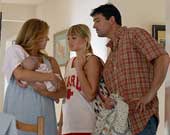Changes to the voting procedures for the Emmy Awards, in both nominations and final tallies, have improved things by widening the field and reducing the rote reappearance of certain nominees. But problems remain, and so does the unpredictability...
 I'm still stung by the absence of major nominations for the stars of NBC's Friday Night Lights, and for the snubbing of ABC's Pushing Daisies among the Best Comedy Series nominees. But as we approach Sunday's 60 Annual Emmy Awards show (ABC, 8 p.m. ET), it's time to look ahead -- at the next choices, and possible mistakes, the final voters can make.
I'm still stung by the absence of major nominations for the stars of NBC's Friday Night Lights, and for the snubbing of ABC's Pushing Daisies among the Best Comedy Series nominees. But as we approach Sunday's 60 Annual Emmy Awards show (ABC, 8 p.m. ET), it's time to look ahead -- at the next choices, and possible mistakes, the final voters can make.
The rules have changed so that anyone casting votes has to pledge to have seen the TV episodes nominated. This may seem like a given, but it's heavier lifting than the academy has required in the past, and eliminates some glaring errors where voters were blinded by star power alone.

Even so, problems persist. TV critics and loyal viewers usually are aware of a show's entire season-long output. They can say, for example, whether last year's run of ABC's Lost was an excellent one (it was), or whether, overall, Gabriel Byrne's performance in HBO's In Treatment changed subtly but surely over the course of the season (it did).
In limiting themselves to only the episodes nominated, as many voters do, stand-alone performances and episodes are weighted unfairly. How do you make sense of the characters and intrigue in, say, Showtime's Dexter after an episode or two, or follow the season-long plot lines in HBO's Curb Your Enthusiasm or FX's Damages?

On the other hand, this take-your-best-shot approach favors certain shows and performers. James Spader, who gets handed some especially juicy and lengthy courtroom summations on ABC's Boston Legal, may owe his mantel full of Emmys to this built-in bias. This year, Alec Baldwin may finally get his overdue Emmy for NBC's 30 Rock, simply because of that instant-classic episode in which he role-played an entire black family during an improvised therapy session.
Here are the major-category breakdowns, just for fun.
DRAMA SERIES: House, Dexter, Damages and Lost all had super-strong season endings, and Dexter and Lost may have done the best work overall. But AMC's Mad Men is an interesting dark horse here, and just might take it all. If not, network-TV sentiment might give it to House.
COMEDY SERIES: NBC's 30 Rock was even better than Curb Your Enthusiasm this year. If CBS wins instead for Two and a Half Men, it'll be because that sitcom draws a lot more viewers, period... but this should be 30 Rock's year.
ACTOR, DRAMA: Terrific field, wide enough to include Bryan Cranston from AMC's Breaking Bad and Michael C. Hall from Dexter. Hall and Hugh Laurie from House did the most astounding and consistent work last season (other than the snubbed Kyle Chandler from Friday Night Lights) -- but giving Jon Hamm the award here may be the way the academy finds to honor Mad Men.
ACTRESS, DRAMA: Connie Britton from Friday Night Lights should win, but isn't even nominated. (Let it go, David, let it go.) Of the ones who are here, the winner should be Glenn Close from Damages, in this year's closest thing to a lock.
ACTRESS, COMEDY: I love Tina Fey of 30 Rock and Mary-Louise Parker of Showtime's Weeds, but Julia Louis-Dreyfus did some fabulous work on The New Adventures of Old Christine. If that CBS sitcom presented the right episodes for judging (especially the male-hormone show), she should win.
ACTOR, COMEDY: Alec Baldwin should win this year. But he should have won every year, and he hasn't yet...